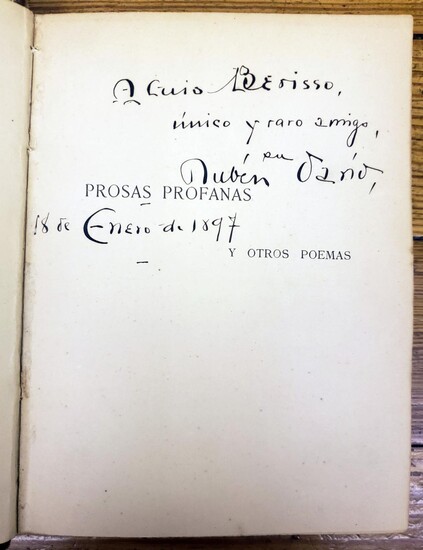PROSAS PROFANAS y Otros Poemas. (Inscribed)
By Ruben Dario
In-8º. (XVI),176pp. Bound in full brown morocco 5 raised bands, very nice binding, with original black back cover. The rare first edition inscribed by Dario to Beriso ¨A Lucio Berisso, único y raro amigo, su Ruben Dario. 18 de Enero de 1897". Profane Prosas was not an immediate publishing success: the five hundred copies of the first edition took years to sell. The title of the book baffled many, including some academic critics who considered it an inadmissible antiphrasis. Why call prose a collection of poems? Whim of the author? Want attention? These comments made Rubén smile, sure of his find. In his autobiography Rubén tells us that those who were scandalized by the title forgot the Latin prosas of the church, something that the great Uruguayan critic José Enrique Rodó, who celebrated the success of Darío, warned. In the liminary words of the poetry book Darío we gave the key to the name "I said, in the pink mass of my youth, my antiphons, my sequences, my profane Prosas". Several of the most celebrated poems of Rubén belong to profane Prosas, such as It was a soft air, Sonatina, Blazon, Margarita, Ite missa est, Colloquium of the Centaurs, New Year, Responso, (Verlaine) and I follow a form. It is not the purpose of this article to analyze the compositions included in this modernist breviary. When Profane Prosas appeared, Rubén Darío was 30 years old. He had arrived in Buenos Aires in August 1893 and, by then, he was already the indisputable standard-bearer of modernism, the new literary school that emerged in Hispanic America. Prosas Profanas is Rubén's modernist book par excellence, the "full spring" of the renovating movement of the language that Darío had to lead and that gave his own profile to Spanish-American letters. Federico de Onís maintains that profane Prosas "indicates the full realization of new art and about it there was the capital battle of the literary revolution that was called modernism and that spread throughout the world."
Published by: Imprenta de Pablo E. Coni é Hijos. Buenos Aires., 1896
Vendor: Chaco 4ever Books
Buy Now on
By Ruben Dario
In-8º. (XVI),176pp. Bound in full brown morocco 5 raised bands, very nice binding, with original black back cover. The rare first edition inscribed by Dario to Beriso ¨A Lucio Berisso, único y raro amigo, su Ruben Dario. 18 de Enero de 1897". Profane Prosas was not an immediate publishing success: the five hundred copies of the first edition took years to sell. The title of the book baffled many, including some academic critics who considered it an inadmissible antiphrasis. Why call prose a collection of poems? Whim of the author? Want attention? These comments made Rubén smile, sure of his find. In his autobiography Rubén tells us that those who were scandalized by the title forgot the Latin prosas of the church, something that the great Uruguayan critic José Enrique Rodó, who celebrated the success of Darío, warned. In the liminary words of the poetry book Darío we gave the key to the name "I said, in the pink mass of my youth, my antiphons, my sequences, my profane Prosas". Several of the most celebrated poems of Rubén belong to profane Prosas, such as It was a soft air, Sonatina, Blazon, Margarita, Ite missa est, Colloquium of the Centaurs, New Year, Responso, (Verlaine) and I follow a form. It is not the purpose of this article to analyze the compositions included in this modernist breviary. When Profane Prosas appeared, Rubén Darío was 30 years old. He had arrived in Buenos Aires in August 1893 and, by then, he was already the indisputable standard-bearer of modernism, the new literary school that emerged in Hispanic America. Prosas Profanas is Rubén's modernist book par excellence, the "full spring" of the renovating movement of the language that Darío had to lead and that gave his own profile to Spanish-American letters. Federico de Onís maintains that profane Prosas "indicates the full realization of new art and about it there was the capital battle of the literary revolution that was called modernism and that spread throughout the world."
Published by: Imprenta de Pablo E. Coni é Hijos. Buenos Aires., 1896
Vendor: Chaco 4ever Books



